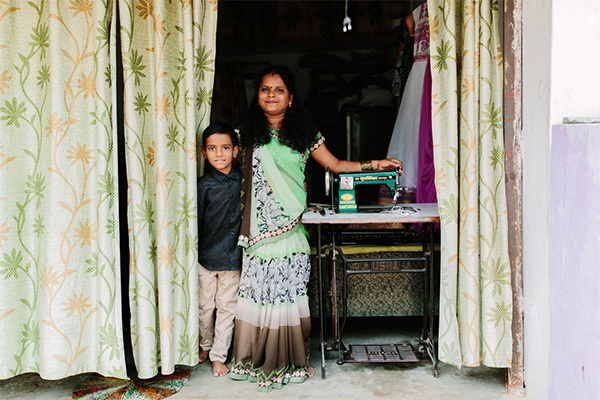Sangeeta's sewing success

Sangeeta and her son at her tailoring business in Nagpur, India. © Kim Landy
Growing up in Nagpur, India, Sangeeta left school early to enter the workforce. There was barely enough food and her family just managed to get by. Sangeeta needed to earn money, so she began sewing at a local business. She worked seven days a week mending dresses and used her income to help provide for her family.
“I brought groceries for home as we were not able to eat good food,” she said.
Eventually, Sangeeta’s hard work began to pay off and she built a loyal customer base. “I provided door-to-door service and then after a few days people came to know about me and started giving me clothes [to sew].”
Now married and with a young child of her own, Sangeeta needed to earn enough to provide for her family. With a loan through Opportunity International Australia’s program partner ESAF, she purchased a sewing machine, table and some dress material to start her own business.
The mother turned entrepreneur is one of the lucky few. In India, women’s participation in the workforce is falling. In 2019, only 21 per cent of women in India were working compared to 30 per cent more than a decade ago.
Many women are discouraged from working outside of the home due to cultural norms and instead prioritise unpaid housework and care work. COVID-19 could also worsen women’s labour force participation rate. When jobs become scarce, families tend to send men out to earn, and women stay behind.
Despite these challenges, Sangeeta’s business has grown. Today she has four sewing machines and employs two local women. Sangeeta earns more than five times the amount per dress than when she worked for an employer.
“These days we eat good food, our living standard has risen. I invested the money in savings and also purchased a plot [of land],” she said. “Before marriage the situation was very tough but now everything is fine.”
“All those who are in need, I can help them. There are many women who are in great need.”
In the future, Sangeeta hopes to hire more women and invest in new machinery. She wants to give other women the chance to earn a living independently and with dignity.
“All those who are in need, I can help them. There are many women who are in great need,” Sangeeta said. “Women are not allowed to come out of their homes and work, so if they work under a woman, they will be more comfortable.”
Sangeeta is also the leader of her ‘sangam’ or loan group. Thirty local women meet each week to access loan disbursements and repayments.
The meetings provide an opportunity for women to share concerns and support each other. Some group meetings also provide financial literacy and women’s empowerment training, giving women more agency in financial matters in the home.
“If there is a problem in someone’s house we all gather together to handle this situation,” Sangeeta said. “If someone is not having money then I help them by lending them money."
“Whatever they [my children] want to become I will help them to achieve it."
Through this leadership role, Sangeeta has helped other women to grow their businesses, such as Raksha.
“Raksha used to do household work but she was not satisfied with that,” Sangeeta said. “When she was not able to pay for her child’s school fees, she would come and ask for money.”
Raksha had started a small business to earn additional income but only had a few customers. Through the sangam she met other local women and expanded to new customers.
“So we decided to help her by giving her loan on credit and meanwhile she joined the sangam,” Sangeeta said. “We thought of helping her by not just giving her money but by giving her business.”
Looking to the future, Sangeeta hopes her children will follow their dreams.
“Whatever they [my children] want to become I will help them to achieve it. I will not pressure my children to become a doctor or engineer,” she said. “I will try and help them to fulfil their dreams, whatever they want to become."
Find out more about how microfinance helps women out of poverty